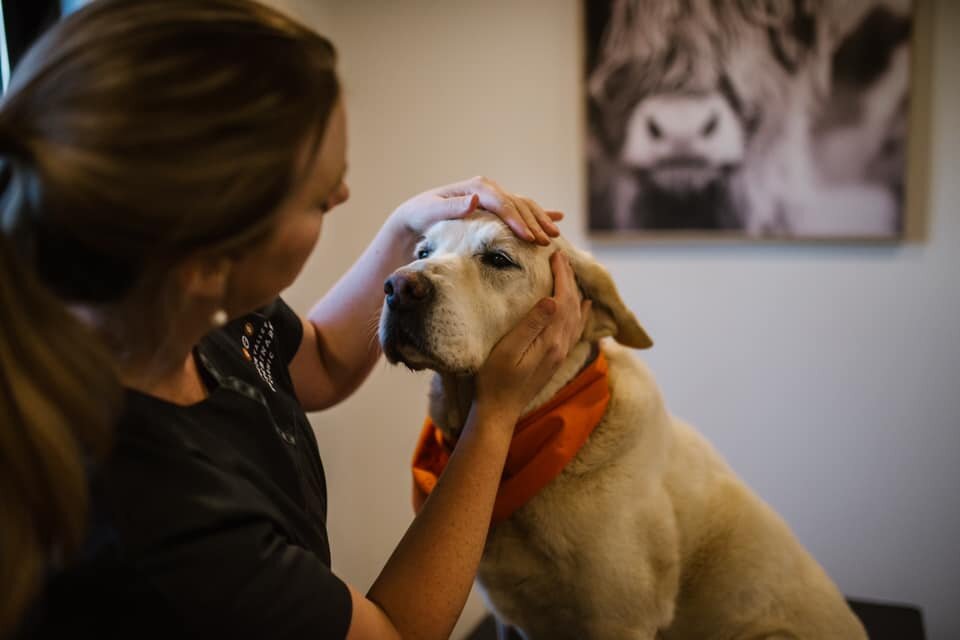Forth Valley Veterinary Clinic Blog
Our top tips and useful information regarding pet and animal health…

Flystrike
Does the idea of maggots feeding on living flesh give you the heebie-jeebies? Us too!
Fly strike can be confirmed by visualising maggots crawling across the skin. There is usually a foul odour associated with the strike which becomes familiar to those with sheep – or veterinary professionals! It’s the same rotten smell that attracts the flies in the first place.

Lice
One louse. Two or more lice.
Knits = lice eggs.
Humans and animals alike are prone to getting lice. Lice are very species specific – meaning that dog lice do not live on cats/sheep/humans and human lice do not live on horses/cows/dog etc. They also don’t like to live off their host for long – so close contact of two or more of the same species is generally required for them to spread.

Arthritis
t can be as uncomfortable for our dogs as it is in humans - but there are ways of managing the disease to ease your pet's pain.
Arthritis simply means 'inflammation of the joints' and is a common problem for many dogs. Most of you will no doubt know of a dog suffering from arthritis that has shown the textbook signs of pain, discomfort and stiffness.

Tapeworm
There are many different types of tapeworm which can affect domestic animals. The most common type is the Flea Tapeworm (Dipylidium caninum). This tapeworm lives in the small intestines of cats and dogs (and occasionally children) and releases small, white packages of eggs which appear like cucumber seeds or grains of rice in the faeces or around the anus of cats and dogs. An intermediate host – typically a flea or louse – will ingest the eggs and they develop into an infective stage within the flea/louse at which time the flea/louse is ingested while grooming and then the tapeworm reinfects the dog/cat.

Whipworm, Hookworm and Heartworm
This small thread-like 6mm worm lives in the large intestine of dogs and causes local irritation in this area. Clinical signs are of blood in the stools, watery/gooey diarrhoea, straining to defaecate and weight loss.
Diagnosis can be challenging as the female worms only produce eggs periodically, so they can be missed in a standard faecal floatation test. Also, the clinical signs of whipworm infection mimic many other syndromes.

Roundworm
Toxocara canis is the most common roundworm of the domestic dog, and it is not able to infect cats (cats have their own species of roundworm). Its presence can go completely without symptoms although more often it creates diarrhoea, vomiting, poor growth, pot-belly and weight loss in the canine host. Sometimes the sheer volume of infection can cause such poor nutrition, even bowel blockage, and can lead to death.

Rat Bait
As we move into the cooler weather, we will do anything to escape the cold….. so do those pesky rodents! We all know how frustrating mice and rats can be, causing absolute chaos to our homes and property. Unfortunately it can also be the case for our furry friends. They will eat it, despite what the packaging states. It is a condition to be taken seriously and early diagnosis and treatment may prove life-saving.

Senior Health Checks
As our pets get older they can be more prone to certain medical issues and may need a bit more attention.
There are many issues that can affect our pets as they age and, as with all things, if we pick these early we can stop the progression and help your pet to live a longer, happier and more comfortable life.

Ticks
In Tasmania we have one type of Ixodes tick which can cause paralysis. Though generally not as severe as their mainland sisters, they can still cause paralysis and ultimately death of your pet if left untreated.
Female ticks attach onto the skin and secrete saliva into the bite site to prevent blood clotting so that they can have a nice long drink of blood. The saliva contains toxins which lead to paralysis. The long nerves are affected first – the hind legs and voice are usually the first areas to show change. Over time the paralysis creeps forward from the back legs until the entire body, including breathing muscles, are affected. Sometimes the toxins can directly affect the heart.

Fleas
These small insects cause our pets grief by crawling through their coat and biting them.
Cat and dog fleas particularly like to feed from cats and dogs but can bite people if the opportunity arises. Rabbit fleas prefer rabbits but will also attach to the ears of cats.

Ear Infections in Dogs
Ear infections are very common in dogs and those cute floppy-eared pets are much more susceptible than those with upright ears. Unlike humans, the ear canal of a dog is almost vertical, making it easy to retain moisture and debris.

Train your Dogs Responses
All dogs have many different triggers that can cause a fear response. Unfamiliar dogs and people are common triggers. Loud noises can also be very problematic for fearful dogs. Fireworks are especially terrifying, trucks, motorbikes and excessively noisy cars can also be problematic.

Compassion
We’re feeling sad. One of our patients died.
One of the vets spent an enormous amount of their own time working on this patient. There is a feeling of deflation.

Heat Stress and Dehydration
Dogs cannot sweat through their skin as humans do, they sweat primarily from their nose and paw pads and expel heat via panting. On a hot day they can easily become overheated, signs of a heat stressed animal include excessive panting and lethargy. Avoid your dog becoming too overheated and succumbing to heatstroke.

Tips to Keep Your Short-Nosed Friend Cooler This Summer
We all know that summer can be a dangerous time for dogs. As they are susceptible to heatstress and suffer very easily. There is a breed of dog that is even more at risk than others- the Brachycephalic dog breeds, these breeds need more precautions than normal when it comes to the dangers of heat.

Parasites
The warmer weather provides the perfect breeding conditions for fleas and ticks. Breeding requires energy and energy requires food and that food is BLOOD. Fleas and ticks bite animals (and sometimes humans) and secrete saliva into the bite site to allow easy extraction of blood. This saliva can cause allergic reactions and sometimes more complicated conditions as discussed below. Prevention of fleas and ticks is the best treatment.

BBQ's and Family Picnics
Everyone loves a cookout, especially your pet, who gets to feast on table scraps. Some surprising foods, such as grapes, onions, garlic and raisins, can be toxic to dogs if consumed in large quantities and should stay off their menu.

Ancestry of Dogs
Dogs or at least the modern-day breeds have come a long way since their original canine ancestor; the wolf. Domestication has caused the canine companion to have a reduced brain size, floppy ears, increased docility and hormonal changes.

Easter Dangers
Easter... my favourite holiday. They only time you can eat chocolate for breakfast without the guilt.
Unfortunately the same isn’t for our fur babies. During the month of April we will be doing mini blog posts on dangerous foods for your pets!

Christmas Dangers
Christmas is coming!!
Along with unwanted extra weight, Christmas carries some added dangers for your pets that you may not be aware of.
Our staff are wildly passionate about animals and making sure your pet is living its healthiest and happiest life
Back that passion with expert qualifications and a love of learning, and it’s safe to say your fur family is in very safe hands.
